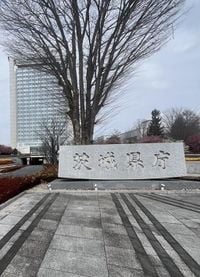In Ibaraki Prefecture, Governor Kazuhiko Oigawa, who took office eight years ago after notable tenures at the University of Tokyo, the Ministry of Economy, Trade and Industry, and Microsoft, is currently under intense scrutiny. While he proudly boasts that the region has the highest number of factory attraction cases in Japan, a darker side of his administration has emerged, revealing a troubling mental health crisis among his employees.
As of now, 115 employees have taken leave due to mental health issues, marking the highest number ever recorded in the prefecture. This alarming statistic comes despite Oigawa's claims of success, as he highlighted during his New Year's address on January 6, 2025. In this address, broadcasted within the Ibaraki Prefectural Office, Oigawa celebrated the prefecture's achievements, stating, "In 2023, the number of companies establishing offices outside the prefecture was the highest in Japan for the seventh consecutive year. Exports of agricultural products have increased thirteen-fold since before I took office, and tourism consumption has reached record highs."
His seventh New Year's address was notable for its tone, as he expressed pride in his staff's efforts, urging them to maintain their health while pursuing ambitious goals for Ibaraki's future. However, the reality for many employees tells a different story. One staff member cynically remarked, "It’s not pride; it’s dust," reflecting the discontent brewing beneath the surface.
Critics of Oigawa's administration have pointed to a culture of overwork and alleged power harassment as contributing factors to the mental health crisis. A member of the Ibaraki Prefectural Assembly stated, "Since Oigawa took office, he has imposed excessive quotas on the staff, leading to long hours and a toxic work environment. We have seen over 100 employees fall ill mentally, and more than ten have tragically taken their own lives during his administration, marking an 'abnormal situation.'" This sentiment underscores the growing frustration among employees who feel the pressure of relentless demands.
On February 12, 2025, the prefecture made a sudden announcement regarding the suicide of Takuya Sakuragi, a 41-year-old employee in the secretary section, who took his life on October 20, 2024. Sakuragi had been serving as the secretary for Vice Governor Hiroyuki Iizuka. Following his death, the prefecture quietly established a third-party committee to investigate allegations of power harassment against Iizuka, which included interviewing related parties and examining communication logs from work-issued cell phones.
Despite the serious nature of these allegations, the investigation concluded with Iizuka and the secretary section chief receiving only a strict warning, while the committee found no evidence of power harassment. This conclusion has raised eyebrows, particularly since the investigation's findings were kept private, citing the family's wishes. Critics argue that the investigation's integrity is compromised, as it was overseen by Oigawa, whose leadership is now under scrutiny.
In light of these events, the atmosphere within the Ibaraki Prefectural Office has become increasingly fraught. Employees have reported feeling overburdened and demoralized, with many questioning the administration's commitment to their well-being. The situation has sparked a wider conversation about workplace culture in Japan, where mental health issues often remain stigmatized and unaddressed.
As these developments unfold, the citizens of Ibaraki are left to ponder the implications of Oigawa's leadership. While he touts his administration's economic successes, the human cost of his policies cannot be ignored. The juxtaposition of record highs in factory attraction and exports against the backdrop of employee distress paints a troubling picture of governance in the prefecture.
Oigawa's administration has not only faced criticism from within but also from the public, as the issue of mental health in the workplace gains more attention. Calls for reform are growing louder, with advocates urging for a reevaluation of workplace policies to ensure that employee welfare is prioritized alongside economic goals.
The future of Ibaraki Prefecture hangs in the balance as the community grapples with the fallout from these revelations. Will Governor Oigawa adapt his approach to foster a healthier work environment, or will the pressure of his ambitious agenda continue to take a toll on his staff? The answers remain to be seen, but the stakes are undeniably high for the people of Ibaraki.
As the situation develops, it is crucial for all stakeholders, including the government, employees, and citizens, to engage in an open dialogue about the importance of mental health and the need for supportive workplace environments. The tragic losses experienced within the prefecture serve as a stark reminder of the consequences of neglecting these vital issues.




